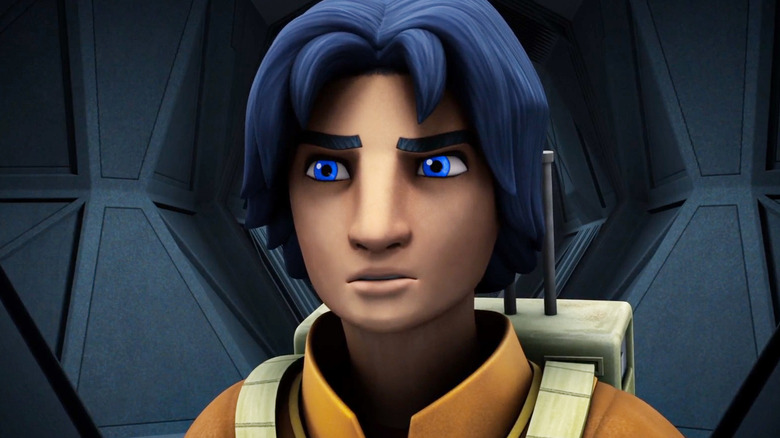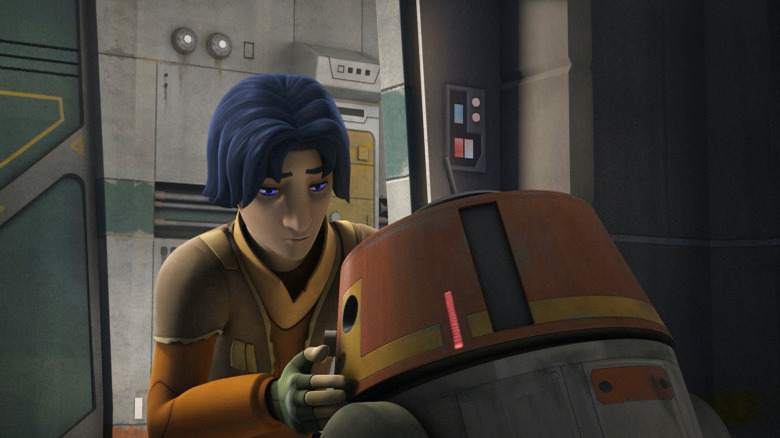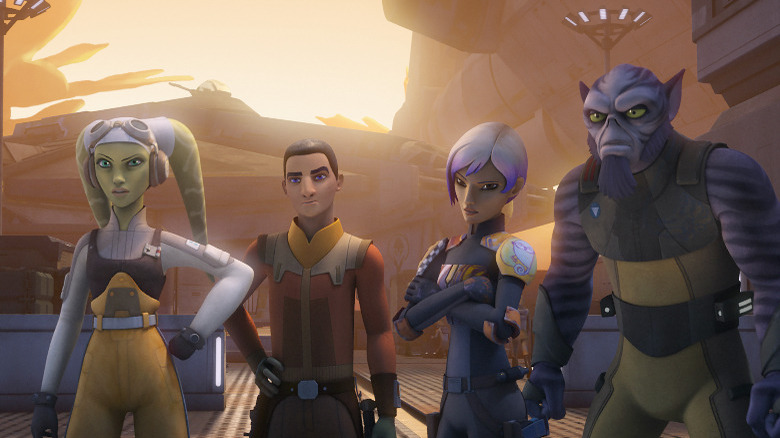The Ridiculous Studio Note That One Star Wars Rebels Producer Compared To Poochie From The Simpsons [Exclusive]
While "Star Wars" films and TV shows have never exactly been un-family-friendly (the more adult moments in "Andor" and the Wookiee erotica in "The Star Wars Holiday Special" aside), they have also never really been aimed at the juice box crowd (again, save for specific elements, like Jar Jar Binks' slapstick antics in "The Phantom Menace"). George Lucas undoubtedly ruffled some feathers when he infamously said "A New Hope" was a film designed "for 12-year-olds" at the 2017 Star Wars Celebration, yet even then the actual point he was trying to get across was that he had envisioned it as a "Flash Gordon"-styled "high adventure film" like the ones he loved watching growing up, "but with meaningful psychological themes."
When it concerns the animated side of "Star Wars," the franchise initially skewed younger with the Legends (i.e. non-canonical) 1980s Saturday cartoon series "Droids" and "Ewoks." Genndy Tartakovsky's own non-canon 2003 "Clone Wars" mini-series, on the other hand, had more in common with Tartakovsky's "Samurai Jack," blending hard-edged, high-octane violence with a grittier and more somber vibe. At first, the subsequent computer-animated "Clone Wars" series created by Lucas — with Dave Filoni serving as its supervising director — split the difference between those tonal extremes. However, by its final season in 2020, the show had evolved into a full-blown war epic loaded with the kind of political subtext and "meaningful psychological themes" Lucas valued.
"Star Wars Rebels," which premiered on Disney XD two years after Disney bought Lucasfilm in 2012, would eventually become an equally mature and thoughtful piece of animated storytelling in its own right. Starting out, though, the Mouse House had a very different vision for the show, as executive producer and writer Henry Gilroy recalled during an interview with /Film's Rafael Motamayor.
Ezra to the max
"Rebels" follows a ragtag group of characters as they band together to fight the Galactic Empire's forces on the planet Lothal at the onset of the galaxy-wide Rebellion. It was fairly light-hearted at first; where "Clone Wars" dropped viewers right into the middle of the titular conflict, the Galactic Civil War was only warming up when "Rebels" began. What's more, the villains in the series' first season were fairly broad and incompetent, and rarely seemed to pose any genuine danger. Not at first, anyway.
Describing "Rebels" as "Clone Wars"-lite in its early episodes, Henry Gilroy indicated this was mostly Disney's doing. "At one point I had to send my responses to the Lucasfilm executive before they went to Disney," Gilroy explained. Having previously served as a writer on "Clone Wars," Gilroy believed his job going into "Rebels" was "to protect the 'Star Wars' brand, not the Disney brand. And at the time, there was a difference [between] that and what they wanted that to be."
That difference in creative vision manifests itself in the first half of "Rebels" season 1. One often gets a feeling in these episodes that the show wants to delve deeper into its characters' tragic backstories and psychological complexities (as it would in later seasons), but is forced to hold back, lest it becomes too serious for Disney's liking. It could have been far worse, though. Gilroy remembered that, at one point, the Mouse House pushed for the series' youngest hero, Ezra Bridger, to ride his droid companion Chopper like a skateboard:
"I hated that image from the beginning. It's so Poochie. It's extreme Ezra to the max. So I made a commitment to myself. I'm never going to have Ezra riding his droid like a skateboard. Droid's not a freaking skateboard."
Don't talk down to your audience
Poochie, for those unfamiliar, was a character on "The Simpsons" season 8, episode 14. Titled "The Itchy & Scratchy & Poochie Show," the episode sees the creators of the Simpson kids' beloved ultra-violent cartoon series, "The Itchy & Scratchy Show," trying to reverse its dwindling ratings by introducing Poochie, a cartoon dog who raps and spouts catchphrases like, "Catch you on the flip side, dudemeisters! NOT!" Of course, Homer voices him, and of course, Poochie is a total failure. His death even leads to an increase in viewership for "The Itchy & Scratchy Show" and gave us the famous "Simpsons" title card gag: "Poochie died on the way back to his home planet."
Obviously, the point the episode is making is creatives who blatantly try to appeal to specific demographics, especially kids, are doomed to fail, and are better off trusting their audience will respond to artistic integrity. Henry Gilroy confirmed the Chopper-as-a-skateboard note was one of many similarly ill-advised attempts by Disney to soften the show's tone, even though "war is in the title of the show." He explained:
"It was more like, 'Can you add a Chopper jet gag here?' We get notes like that. I think whenever you talk down to kids though, they know that you're talking down to them. They don't like it."
Over time, Disney got the message and "Rebels" came into its own, integrating richer spiritual themes, legitimately threatening antagonists, and more complicated dilemmas for its heroes to overcome. In doing so, it also a precedent for later "Star Wars" animated projects like "The Bad Batch" and "Tales of the Jedi," both of which recognized right out the gate: Just because they belong to a franchise intended "for 12-year-olds," that's no excuse for empty, condescending storytelling.


